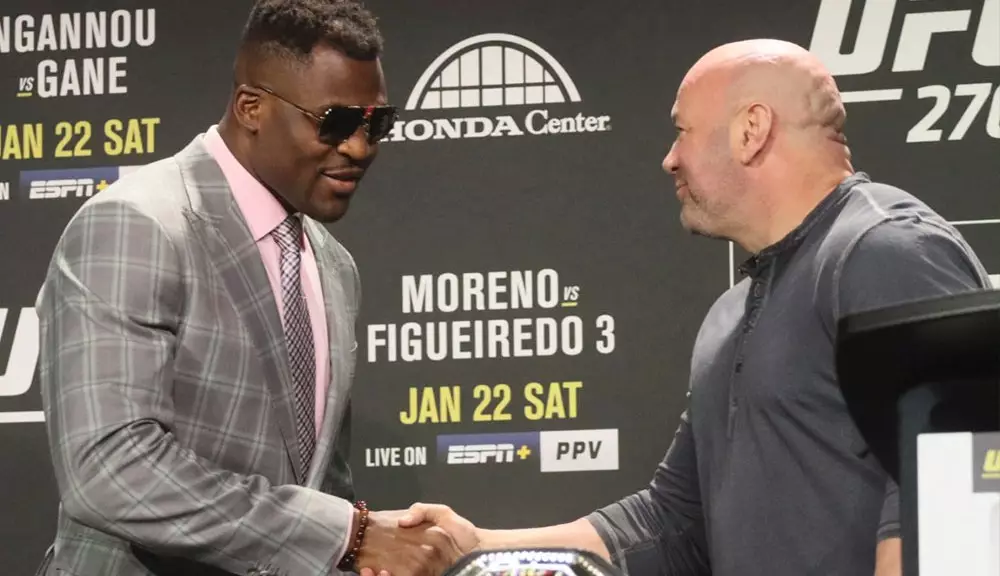The world of mixed martial arts (MMA) is not just defined by the physicality and technique displayed within the octagon; it is also shaped by the narratives outside of the cage. One such high-profile saga involves Francis Ngannou, a former UFC heavyweight champion, and Dana White, the CEO of the UFC. Their ongoing feud illustrates the complexity of professional relationships in sports, highlighting not only personal grievances but also the implications for fighters navigating their careers.
The Bitter Divorce: Understanding the Tension
The tension between Ngannou and White represents a classic case of differing narratives following a bitter parting. Dana White recently articulated his personal disdain for Ngannou in an interview, claiming the animosity dates back to before Ngannou achieved heavyweight title status. White’s public remarks indicate that his perception of Ngannou has shifted over time, showcasing the propensity for revisionist history within the sport. This suggests that often, public figures may craft their narratives to suit present circumstances, leading to new interpretations of past events.
White’s sharp critique extends beyond aesthetic judgments of fights; he has commented on Ngannou’s character, hinting at deeper issues that led to their fractious relationship. His assertion that Ngannou “plays the good guy” introduces a layer of complexity to the discussion, as it challenges the public’s romanticized view of fighters. The UFC president suggests that Ngannou’s persona was disingenuous, raising questions about authenticity in the world of MMA. While Ngannou has maintained that his departure was rooted in contractual disputes, White’s position offers an alternative narrative: that personal issues ultimately influenced their professional rapport.
Ngannou’s fight record serves as a significant element in this discussion. Despite his achievements in the Octagon, including spectacular knockouts and a long-awaited title victory, White’s criticism of particular performances—most notably his loss against Derrick Lewis—demonstrates how fighters are often judged not just by their accomplishments but also by the narratives surrounding them. White’s description of the Lewis fight as one of the worst in UFC history underscores the weight that perceptions carry in the evaluation of an athlete’s legacy.
The fallout from Ngannou’s split from the UFC has been characterized by a blend of triumph and challenges. Following his departure, Ngannou has faced setbacks in boxing, losing matches against eminent fighters like Tyson Fury and Anthony Joshua. These defeats, paired with his successful debut in the Professional Fighters League (PFL), illustrate the dual nature of his ongoing saga: moments of victory juxtaposed with professional pitfalls.
Examining the interactions between fighters and promoters unveils a complicated web of emotions, prestige, and marketability. Dana White’s commentary suggests that the professional landscape of MMA is not solely a battleground for athletic prowess but also a strategic field where personal dynamics can dictate business decisions. This speaks to the broader conversation around how promotional leaders and fighters weigh personal affinity against business pragmatism.
White’s assertion that he no longer considers Ngannou’s potential in the sport is telling. His comment about Ngannou owing him for disallowed fights further emphasizes a frictional and transactional relationship model that often exists in professional sports. This is significant because it hints at the boundaries between admiration for a fighter’s skills and the personal dislike that can arise from complex interpersonal relationships.
The enduring animosity between Francis Ngannou and Dana White serves as a testament to the intricate dynamics of the MMA industry. As fans, analysts, and aspiring fighters watch this saga unfold, it becomes clear that behind the punches and headlining bouts lie personal narratives shaping the future of the sport. The possibility of Ngannou and White ever collaborating again appears dim, especially as both continue along their divergent paths.
Ultimately, the Ngannou-White saga encapsulates broader themes in MMA—where personal estrangement can heavily influence professional trajectories, and where the story told may evolve over time. As Ngannou forges his future in the PFL while attempting to reassert his legacy following setbacks in boxing, and as White maintains control of UFC’s destiny, the industry watches closely, knowing that every feud offers insights into the complexities of sport, business, and humanity.

